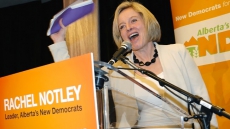OTTAWA — Documents outlining how the federal government chose 12 economic regions for extended EI benefits suggest Edmonton and at least two other areas would now qualify for the same help.
The documents, obtained by The Canadian Press under the Access to Information Act, explain why other regions didn't qualify for the help, which was aimed specifically at areas hit hard by a prolonged downturn in commodity prices.
University of Calgary economist Trevor Tombe says three regions — Edmonton, southern Saskatchewan and B.C.'s southern interior — would qualify under the government's formula when accounting for the latest unemployment figures.
He says at least two more regions, Yellowknife and Thunder Bay, could qualify next month provided the unemployment rate does not drop significantly.
Qualifying regions had unemployment rates that were at least two per cent higher over three consecutive months between July 2015 and March 2016 from the baseline rate, defined as the lowest unemployment rate recorded between December 2014 and February 2015.
To qualify, regions had to show a "sharp" and "sustained" increase in the unemployment rate, with no "significant signs of recovery," the documents show.
The documents — created by Employment and Social Development Canada, the department responsible for the EI program — show the government took that to mean that the unemployment rate after the three-month stretch didn't fall back to within one per cent of the baseline.
Tombe said the government didn't provide the necessary transparency in its budget for Canadians to understand how the 12 regions were selected, leading regions like Edmonton and southern Saskatchewan to feel they were left out for "less than objective reasons."
Now residents will know why they missed out, and have an argument as to why they should be included, he said.
"If those are criteria that the government has decided are worthy of extended unemployment insurance benefits, then when those criteria are met by other regions only a few months later, how could they not receive the same benefits?"
Alberta Premier Rachel Notley wants the federal government to provide the same benefits to workers in Edmonton, and is expected to push the issue with Prime Minister Justin Trudeau when the Liberal leader visits Alberta on Friday.
The documents say the recent rise in unemployment in those parts of the country has "stretched the responsiveness of the EI system." Compounding issues is that the prospect of new work for unemployed oilpatch workers "is usually much more difficult when a decline (in employment) is sector-related."
"When many people are laid off at the same time in a local area, it can take considerably longer for any given worker to find that next job — especially if many laid-off workers have the same skills or trade and if the remaining employers in that industry are not hiring," the document reads.
The federal budget banked $582 million over the next two years to add five weeks of regular benefits to workers in qualifying regions, effective this July but retroactive to January 2015.
Long-tenured workers in the 12 regions identified in the budget could also see an extra 20 weeks of benefits, to a maximum of 70 weeks – again, starting this July but retroactive to January of last year.
The government has also started fast-tracking EI claims from displaced residents of Fort McMurray, and sent Service Canada workers into receptions centres and nearby coffee shops to help anyone needing to file a claim.
The government is also moving ahead with a review of EI services to reverse a belief among many Canadians that they're not getting the level of service they expect when they file a claim, or call Service Canada with an EI-related question. Figures provided by ESDC show that in the last year, that more than a million callers hung up because they were on hold for too long.
Consultations on the review will close in August.



